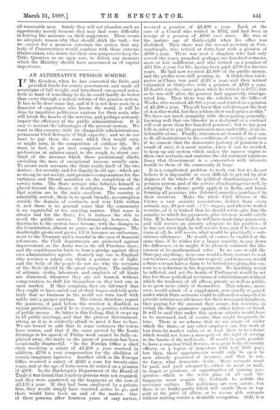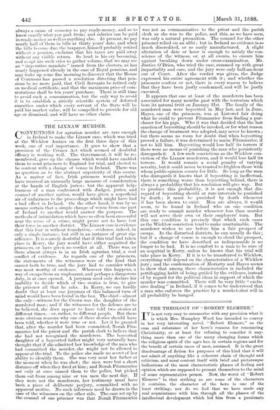AN ALTERNATIVE PENSION SCHEME.
IF Mr. Goschen, when he has converted the Debt, and provided funds for county government, and made all sovereigns of full weight, and introduced one-pound notes, feels in want of something to do, he could hardly do better than carry through a radical reform of the pension system. It has to be done some day, and if it is not done soon by a financier of experience who knows the world, it will be done by impulsive politicians anxious for their seats, who will break the hearts of the services, and perhaps seriously impair the efficiency of the public administration. It is easy to recount the advantages of the present system. We want in this country, with its changeable administrations, permanent Civil Servants of high capacity ; and we do not want to pay them the sums which they would earn, or might earn, in the competition of outdoor life. We want, in fact, to get men competent to be chiefs of professions at salaries equal, in the rough, to about one- third of the incomes which those professional chiefs, excluding the men of exceptional success, usually earn. To secure such servants, the State avails itself of the two desires—for security and for dignity in old age—which are so strong in our society, and promises compensation for dis- turbance, and liberal annuities on the completion of the service term. The State servant who behaves himself is placed beyond the chance of destitution. The results of that system are in the main excellent. The country is admirably served ; there is, to speak broadly, no corruption outside the domain of contracts, and very little within it, and there is no general sense that the community is an ungrateful or too exacting master. That sense is always bad for the State, for it induces the able to avoid the public service. Unfortunately, however, the drawbacks to the system have become, with the changes in the Constitution, almost as grave as its advantages. The deadweight grows and grows, till it becomes an embarrass- ment to the Treasury and a scandal in the eyes of financial reformers ; the Civil departments are protected against improvement, as the Army was in the old Purchase days ; and the constituencies learn to bear a grudge against their own administrative agents. Scarcely any one in England who receives a salary can claim a pension as of right, and the body of the people do not see why the servants of the State should be the great exception. The millions of artisans, clerks, labourers, and employs of all kinds are dismissed, whenever they are not wanted, without compensation, to shift for themselves as they best can in open market. If they complain, they are informed that they ought to have saved out of their wages, and told quite truly that no business in the world can turn itself with safety into a pauper asylum. The voters, therefore, regard the pensions, if paid before the receiver is disabled, as unjust gratuities ; and if he is young, as positive robberies of public money. So bitter is this feeling, that it crops up in all public meetings, and that the present Government, strong as it is, is evidently afraid to meet it face to face. We are bound to add that in some instances the voters have reason, and that if the cases quoted by Mr. Louis Jennings in his speech of Friday week cannot be fully ex- plained away, the laxity in the grant of pensions has been occasionally disgraceful. "In the Foreign Office a chief clerk receiving a salary of £1,250 a year received in addition £794 a year compensation for the abolition of certain imaginary agencies. Another clerk in the Foreign Office received a salary of 4925 a year for twenty-nine years, and at the age of forty-seven he retired on a pension of £601. In the Bankruptcy Department of the Board of Trade it was found that fourteen persons were not required, and they were quartered on the taxpayers at the cost of 43,135 a year. If they had been employed by a private firm, they would simply have received notice to go, and there would have been an end of the matter. One of these persons, after fourteen years of easy service,
received a pension of £1,200 a year. Look at the case of a Consul who retired in 1852, and had been in receipt of a pension of £600 ever since. He was at the mature age of thirty-eight when his office was abolished. Then there was the second secretary at Con- stantinople, who retired at forty-four with a pension of £900 a year. There • was next a chaplain who had only served two years, preached, perhaps, one hundred sermons, more or less indifferent, and who retired on a pension of £75 10s. a year for life, having been paid £700 for his two, years. He had now received £1,600 of the public money, and the profits were still pouring in. A third-class inter- preter in China was paid £528 a year, and then retired exhausted at thirty-two with a pension of £149 a year. Ill-health was the cause given when he retired in 1875; but as he was still alive, the pension had apparently reinvigo- rated him. Then there was the solicitor in the Office of Works, who received £1,800 a year, and retired on a pension: of £1,200 a year. They all knew that solicitors got the best, of it in this world, but they seldom drew such prizes as this."' We have not much sympathy with cheeseparing generally, knowing well that one blunder in a dockyard or a contract will cost more than five hundred pensions ; but to tax poor folk in order to pay life-pensions to men under fifty, is an in- defensible abuse. Finally, statesmen are bound, if they can„ to fit all institutions to the conditions of society ; and even if we concede that the democratic jealousy of pensions is a result of envy, it is most unwise, when it can be avoided, to keep up any system which makes the masses unjust to their own servants, and sustains the old and most injurious fancy that Government is a corporation with interests hostile to those of the community at large.
It is a complicated problem to work out, but we do not believe it is impossible or even difficult to get rid by slow_ degrees of the whole of the political disadvantages of the pension system, and of the service disadvantages as well, by adopting the scheme partly applied in India, and trans- forming all pensions into deferred annuities purchased by their receivers. Make the whole Civil Service of the Crown a vast annuity association ; deduct from every. servant, say, 10 per cent. cf his wages ; and when he wishes to retire, or it is wished that he should retire, give him the annuity to which his payments, plus interest, would entitle him. If he has risen high, he will have made large payments, and will receive an annuity adequate to his position ; if he has not risen high, he will receive less; and, if he has not risen at all, he will receive what would be practically a sub- sistence allowance. He would, of course, be enabled at the same time, if he wishes for a larger annuity, to pay down the difference, or he might, if he pleased, commute his life-- interest at its mathematical value. In no case would the. State pay anything ; in no case would a State servant be sent out to starve, except at his own request; and in no case would a State servant have a claim to be bribed into giving his con- sent to a reduction in his department. No hardship would'. be inflicted, and yet the hands of Parliament would be set free for those periodical revisions of establishments without which the tendency of all offices, private as well as public, is to grow more costly of themselves. This scheme, more- over, would admit of a supplement, now cruelly required, under which State servants could be allowed or compelled to provide subsistence allowance for their wives and daughters, they paying for the amount they secure, but receiving in return the State guarantee against either failure or fraud.
It will be said that under this system salaries would have to be increased, and, of course, that might frequently be
true. There is no scheme that we are aware of under which the State, or any other employer, can buy work at less than its market value, or at least there is no scheme which would not leave a monopoly of the right of serving in the hands of the well-to-do. It would be quite possible to have a superior Civil Service, or a great body of cavalry officers, or a legion of inspectors with very little pay ; but then, those appointments would only be open to. men already possessed of incomes, and that is not,. we fancy, what democrats desire. State servants must be paid, and paid adequately, either in meal or malt,. in wages or pensions, or opportunities of earning per-. quisites—which is the worst plan of all—and the
taxpayers must acquire the fortitude to endure tho. necessary outlays. The politicians are very astute, but
there is no hanky-panky which will enable them to buy gold at the price of silver, or to secure able servants. without making service a desirable occupation. Still, it is always a cause of economy to pay ready-money, and so to know exactly what you part from; and salaries can be paid in ready-money as well as anything else. At present, we pay nearly half of them in bills at thirty years' date, and when the bills become due, the taxpayer, himself probably retired without a pension, exclaims that his taxes are paid away without any visible return. So loud is his cry becoming, and so apt are such cries to gather volume, that we may see an "imperative mandate" issued from the electors, as has nearly happened already in the case of Royal pensions, and may wake up some fine morning to discover that the House of Commons has passed a resolution directing that pen- sions be no more paid, that Civil Servants be retired only on medical certificate, and that the maximum price of com- mutations shall be ten years' purchase. There is still time to avoid such a consummation, but the only way to avoid it is to establish a strictly scientific system of deferred annuities under which every servant of the State will be paid his market value, will be compelled to provide for old age or dismissal, and will have no other claim.



































 Previous page
Previous page